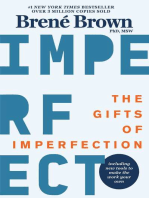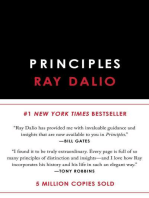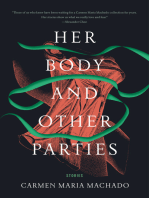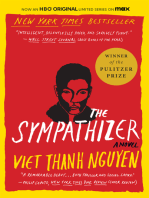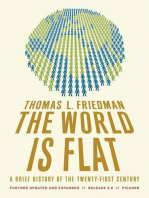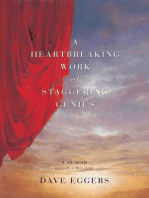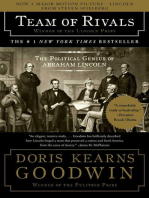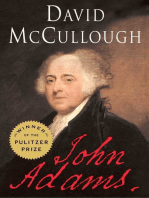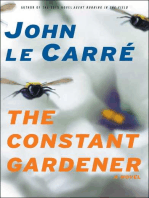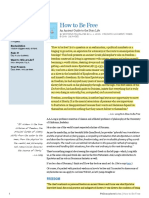Professional Documents
Culture Documents
How To Think Like A Roman Emperor
How To Think Like A Roman Emperor
Uploaded by
beznajaveOriginal Title
Copyright
Available Formats
Share this document
Did you find this document useful?
Is this content inappropriate?
Report this DocumentCopyright:
Available Formats
How To Think Like A Roman Emperor
How To Think Like A Roman Emperor
Uploaded by
beznajaveCopyright:
Available Formats
Brian Johnson’s
PhilosophersNotes
TM
More Wisdom in Less Time
THE BIG IDEAS How to Think Like a Roman Emperor
The Goal of Life
The Stoic Philosophy of Marcus Aurelius
According to Stoics. BY DONALD ROBERTSON · ST. MARTIN’S PRESS © 2019 · 304 PAGES
The Ideal Sage (+ You)
Contemplate It.
Stoic Joy
Is eudaimonic. “The Stoics can teach you how to find a sense of purpose in life, how to face
adversity, how to conquer anger within yourself, moderate your desires, experience
Time Projection
Beats catastrophizing. healthy sources of joy, endure pain and illness patiently and with dignity, exhibit
The Choice of Hercules courage in the face of your anxieties, cope with loss, and perhaps even confront
Is our choice, too. your own mortality while remaining as unperturbed as Socrates. Marcus Aurelius
faced colossal challenges during his reign as emperor of Rome. The Meditations
provides a window into his soul, allowing us to see how he guided himself through
it all. Indeed, I would invite you, as a reader, to put effort into reading this book in
a special way, to try and place yourself in Marcus’s shoes and look at life through
his eyes, through the lens of his philosophy. Let’s see if we can accompany him on
the journey he made as he transformed himself, day by day, into a fully-fledged
Stoic. Fate permitting, more people may be able to apply the wisdom of Stoicism to
the real challenges and everyday problems of modern living. However, that change
won’t leap off the page. It only comes by making a firm decision, here and now, to
begin putting ideas like these into practice. As Marcus wrote to himself,
Waste no more time arguing about what a good man should be;
just be one.”
“At one point, Socrates ~ Donald Robertson from How to Think Like a Roman Emperor
explains in plain language Donald Robertson is one of the world’s leading thinkers, writers AND practitioners of Stoic
what it means to him to be a philosophy. He’s also a therapist who integrates Stoicism into his work with individuals.
philosopher: ‘For I go around
This is our second Note on one of his great books.
doing nothing but persuading
both young and old among you The first Note was on The Philosophy of Cognitive Behavioral Therapy in which he connects the
not to care for your body philosophical underpinnings of CBT (one of the most empirically-validated, effective modern
or your wealth in preference
therapies) to ancient Stoicism.
to or as strongly as for In that book, he also tells us that most modern-day academic “philosophers” act more like
the best possible state of “librarians of the mind” (cataloging the *theory*) rather than “warriors of the mind” (actually
your soul, as I say to you: putting the philosophy into PRACTICE.) <- I just love that distinction.
‘Wealth does not bring about In this book, we get an amazing look into the life and mind (and soul!) of one of history’s greatest
virtue, but virtue makes philosophers who also just so happened to be one of its greatest leaders: Marcus Aurelius.
wealth and everything else
If you want to know how to think like a Roman emperor, start here. I think you’ll enjoy the book
good for me, both individually
as much as I did. (Get a copy here.)
and collectively.’”
The book is part biography and part philosophy. It’s all awesome.
~ Donald Robertson
Of course, it’s packed with Big Ideas and, as always, I’m excited to share a few of my favorites we
can apply to our lives TODAY so let’s jump straight in.
1 PhilosophersNotes | How to Think Like a Roman Emperor
STOICS ON THE GOAL OF LIFE
“Zeno told his students “The schools of Hellenistic philosophy that followed the death of Socrates were often
that he had come to value
distinguished from one another in terms of their definition of the goal of life. For Stoics, that
goal is defined as ‘living in agreement with Nature,’ which we’re told was synonymous with living
wisdom more than wealth
wisely and virtuously. Stoics argued that humans are first and foremost thinking creatures,
or reputation. He used to
capable of exercising reason. Although we share many instincts with other animals, our ability
say, ‘My most profitable
to think rationally is what makes us human. Reason governs our decisions, in a sense—the
journey began on the day I
Stoics call it our ‘ruling faculty.’ It allows us to evaluate our thoughts, feelings, and urges and to
was shipwrecked and lost my
decide if they’re good or bad, healthy or unhealthy. We therefore have an innate duty to protect
entire fortune.’” our ability to reason and to use it properly. When we reason well about life and live rationally,
~ Donald Robertson we exhibit the virtue of wisdom. Living in agreement with Nature, in part, means fulfilling our
natural potential for wisdom; that’s what it means for us to flourish as human beings.
The Stoics therefore took the name of philosophy, meaning ‘love of wisdom,’ quite literally. They
loved wisdom, or loved virtue, above everything else. If ‘virtue’ sounds a bit pompous, the Greek
word for it, arete, is arguably better translated as ‘excellence of character.’ Something excels,
in this sense, if it performs its function well. Humans excel when they think clearly and reason
well about their lives, which amounts to living wisely. The Stoics adopted the Socratic division
of cardinal virtues into wisdom, justice, courage, and moderation. The other three virtues can
be understood as wisdom applied to the social sphere, our relationships with other people.
Displaying courage and moderation involved mastering our fears and desires, respectively,
overcoming what Stoics called the unhealthy ‘passions’ that otherwise interfere with our ability
to live in accord with wisdom and justice.”
Welcome to chapter #1 in which we get a biographical sketch of Marcus Aurelius at the end of his
life along with a quick introduction to the history and underlying philosophy of Stoicism.
The goal of life, according to Stoics? “To live in agreement with Nature.”
What’s that mean? Well, in short, the Stoics believed that what differentiated humans from other
animals is our ability to reason.
To what end should we put that reason? To living with virtue.
Why? So we can benefit society.
“Marcus makes it clear
Massimo Pigliucci reflected on similar wisdom in his great book How to Be a Stoic. Here’s how
that his internal goal is to
he puts it: “Since human beings are naturally social animals capable of reason, it follows that
live with virtue, particularly
we should strive to apply reason to achieve a better society.”
wisdom and justice, but his
That’s one of the reasons why our good emperor wrote to himself: “Think often of the bond that
external aim, his preferred
unites all things in the universe, and their dependence on one another.”
outcome, is the common
welfare of mankind (not And: “Let your one delight and refreshment be to pass from one service to the community to
just of Roman subjects, another, with God ever in mind.”
incidentally). Although the Let’s go back to Massimo who also reflects on the four cardinal virtues of Stoicism. Here’s
outcome is ultimately how he puts it: “The Stoics adopted Socrates’s classification of four aspects of virtue, which
indifferent to Stoics, it’s they thought of as four tightly interlinked character traits: (practical) wisdom, courage,
precisely the action of temperance, and justice. Practical wisdom allows us to make decisions that improve our
pursuing the common good eudaimonia, the (ethically) good life. Courage can be physical, but more broadly refers to the
that constitutes the virtue moral aspect—for instance, the ability to act well under challenging circumstances, as Priscus
of justice.” and Malala did. Temperance makes it possible for us to control our desires and actions so that
we don’t yield to excesses. Justice, for Socrates and the Stoics, refers not to an abstract theory
~ Donald Robertson
of how society should be run, but rather to the practice of treating other human beings with
dignity and fairness.”
2 PhilosophersNotes | How to Think Like a Roman Emperor
Here’s to loving wisdom and to dedicating our lives to becoming the Optimus-best, most
excellent versions of ourselves. In service to the world. TODAY.
CONTEMPLATING THE IDEAL SAGE (+ YOU)
“Marcus actually imagines
“Your first step is to write down the virtues exhibited by someone you respect. Listing the
Nature herself as a physician,
qualities you most admire in another person, just as Marcus does in the first book of The
like Asclepius, the god
Meditations, is a simple and powerful exercise. ...
of medicine, prescribing
In addition to the virtues of real people, the Stoics were also known for contemplating the
hardships to him as if
hypothetical character of an ideal Sage, or wise person. There are several passages where Marcus
they were painful remedies.
appears to be doing this. These descriptions inevitably seem a bit more abstract and grandiose.
To take Nature’s medicine
For example, he says that the perfect wise man is like a true priest of the gods, at one with the
properly, we must accept our
divine element of reason within himself. He is neither corrupted by pleasure nor injured by
fate and respond virtuously,
pain, and he remains untouched by insults. The true Sage is like a fighter in the noblest of fights,
with courage and self- dyed deep with justice. With his whole being, he accepts everything that befalls him, as assigned
discipline, thereby improving him by Fate. He seldom concerns himself with what others say or do unless it’s for the common
our character.” good. He naturally cares for all rational beings, as though they were his brothers and sisters. He
~ Donald Robertson is not swayed by the opinions of just anyone, but he gives special heed to the wise who live in
agreement with Nature. Marcus is trying here to describe human perfection to himself and to
envisage an ideal Sage who completely embodies the Stoic goals of life.
In addition to asking ourselves what qualities the ideal wise person might have, we can ask what
qualities we might hope to possess in the distant future. For instance, what sort of person would
you hope to be after having trained in Stoicism for ten or twenty years?”
That’s from a chapter called “Contemplate the Sage.”
Donald combines his scholarly and practical Stoic wisdom with his equally scholarly and
practical experience as a cognitive behavioral therapist to give us an ASTONISHING array of
practical tools. (Seriously. The book is packed with practical exercises.)
One of the core practices is to, as per the passage above, think about and WRITE DOWN the
virtues you admire in others.
You can also contemplate the virtues of your vision of an ideal Sage.
And... My favorite: You can imagine the virtues YOU, as the ideal version of YOURSELF might
have after a decade or two of consistent practice.
This is almost exactly how we start the Mastery phase of our Optimize Coach program. We start
with a Steven Covey-inspired eulogy exercise in which you attend your own funeral and listen to
what your loved ones have to say about you.
“They taught the young Pause for a moment, if you feel so inspired, and imagine the scene. You’re gone. It’s your funeral.
Marcus that inner calm Who says what?
and happiness are natural Specifically, what VIRTUES do you hope people use to describe you and your presence in their
consequences of a life lived lives? WRITE THOSE DOWN.
well, in accord with genuine
In our Mastery Series, we proceed to help you get more clarity on who you are at your Optimus-
wisdom and self-discipline.”
best so that you can more consistently express those virtues TODAY.
~ Donald Robertson
We need to move out of the abstract, “Oh, yah. That’s how I’d like to be remembered” to a VERY
concrete, “Well, if I *really* think those qualities are important, then TODAY is the day to live in
integrity with them.” (Right?)
Which leads us right into the next piece of wisdom Donald shares which also happens to map
over nearly perfectly with what we encourage our Optimizers to do.
PhilosophersNotes | How to Think Like a Roman Emperor 3
He tells us to reflect on your ideal self and those virtues you intend to embody every morning.
“There are no gurus in
Write them down. Imagine your ideal self interacting with people Today. Who are you? How do
Stoicism. Even the founders
you show up? That’s essentially what Marcus did.
of the school—Zeno,
Cleanthes, and Chrysippus— We call our Optimize process “Carpe Diem Journaling.” We start by getting clarity on our
don’t claim that they were
Optimus-best selves in our Big 3 of Energy + Work + Love. Then we briefly reflect on that best-
self Identity and write down the virtues that version of you embodies. Then we identify the #1
perfectly wise. They believe
behavior we’ll engage in that day as we re-commit to being that version of ourselves TODAY.
we’re all foolish, vicious,
and to some extent enslaved Donald adds a PM reflection and encourages us to go through daily “learning cycles.” At the end
by our passions. The ideal of each day, he tells us to ask ourselves three simple questions:
Sage is perfect by definition, 1. What did you do badly?
but he’s a hypothetical ideal,
2. What did you do well?
like the notion of Utopian
society.” 3. What could you do differently?
~ Donald Robertson Those three questions happen to be exactly the questions Lanny Bassham tells us to reflect on
after a performance. Only, he switches #1 and #2—starting with the positive.
Shall we start that reflection process Today? Actually... How about RIGHT NOW?
If you feel so inspired, reflect on those three questions for your day so far today:
1. What did you do well? _________________________
2. What did you do badly? _________________________
3. What could you do differently? _________________________
Fantastic. Imagine your life in ten to twenty years if the ONLY thing you changed was adding
that simple reflection practice into your life.
Here’s to aggregating and compounding those incremental gains over an extended period of time
so that BEST version of us is the one looking back at us in the mirror in ten or twenty years.
P.S. Donald tells us: “This famous passage from [Pythagoras’s] ‘The Golden Verses,’ which
Epictetus quoted to his students, describes the evening meditation:
Allow not sleep to close your wearied eyes,
Until you have reckoned up each daytime deed:
‘Where did I go wrong? What did I do? And what duty’s left undone?’
From first to last review your acts and then
Reprove yourself for wretched acts, but rejoice in those done well.”
STOIC JOY
“Modern English isn’t well equipped to capture some of the distinctions made in ancient
“The Stoics want us to go
Greek philosophy, especially when it comes to describing emotions and sensations. We use
through a radical upheaval
the word ‘pleasure’ very broadly to encompass almost any positive feeling. However, the Stoics
in our underlying values so
distinguished between the sort of pleasure (hedone) we get from ‘external’ things like food or
that our supreme goal is
sex or flattery and the deeper sense of inner joy (chara) that Marcus is talking about. Stoic joy
to live with wisdom and its
is profound. It comes from achieving your fundamental goal in life and experiencing genuine
accompanying virtues.” fulfillment, which make ordinary pleasures seem trivial by comparison. Ordinary pleasures
~ Donald Robertson often ruffle our minds, especially when indulged in too much. Stoic joy never does this—it’s
synonymous with inner peace and knows no excess. The Stoics refer to it as the pure form of
‘joy’ that someone experiences who is living a truly great life and has attained genuine personal
fulfillment (eudaimonia). Of course, none of us are there yet, but all of us may, potentially,
glimpse the goal as long as we’re heading in the right direction.”
4 PhilosophersNotes | How to Think Like a Roman Emperor
Stoic joy. It’s profound.
“For instance, when people
And, as you can expect, it’s not the kind that’s found in chasing external things like food or sex or
disagreed with Marcus,
flattery. It’s the natural by-product of a life well lived.
he first tried to persuade
them to see things from In fact, Donald tells us that “The Stoics tended to view joy not as the goal of life, which is
his perspective. However, if
wisdom, but as a by-product of it, so they believed that trying to pursue it directly might lead
us down the wrong path if it’s sought at the expense of wisdom.”
they persisted in obstructing
what he believed to be a just He also tells us that Stoic joy is ACTIVE—it’s the result of things we DO, not things that happen
course of action, he remained to us. What kinds of things? Simple: “The wise man’s sense of delight comes from one thing
calm and transformed the alone: acting consistently in accord with virtue.”
obstacle into an opportunity P.S. Donald also tells us: “The Greek word for joy (chara) is closely related to that for gratitude.
to practice some other (charis).” <- Which is probably why modern scientists tell us that gratitude is such a key part of
virtue, such as patience, joyful flourishing.
restraint, or understanding.
His equanimity remained intact TIME PROJECTION
as long as he never desired
“Another simple and powerful technique is to ask yourself how you would feel about the
what was beyond his grasp, situation that worries you in ten or twenty years’ time, looking back on it from the future. It’s
which constitutes one of an example of a more general strategy known as ‘time projection.’ In other words, you can help
the foundations of the Stoic yourself develop a philosophical attitude toward adversity by asking, ‘If this will seem trivial to
remedy for worry and anxiety.” me twenty years from now, then why shouldn’t I view it as trivial today instead of worrying about
~ Donald Robertson it as if it’s a catastrophe?’ You’ll often find that shifting your perspective in terms of time can
change how you feel about a setback by making it seem less catastrophic.”
That’s another Stoic-psychological tool from a chapter called “The Inner Citadel and War of
Many Nations.” Sub-section: “Decatastrophizing and the Contemplation of Impermanence.”
One of the core practices of cognitive behavioral therapy (inspired by Stoicism) is called
“decatastrophizing.”
As you may have noticed, when something “negative” happens, we tend to focus on (and
exaggerate) all the negative aspects and, as a result, make it MUCH worse than it needed to be.
Aka, we “catastrophize” it.
One way to decatastrophize? Time projection. Shall we do it now?
Anything currently stressing you out? (Of course there is! Hah. You’re human.)
So... Let’s pick one thing.
Got it?
Now, fast forward ten or twenty years. Look at your current problem from THAT vantage point.
And... Ask yourself, “If this will seem trivial to me twenty years from now, then why shouldn’t I
view it as trivial today instead of worrying about it as if it’s a catastrophe?”
THE CHOICE OF HERCULES
“‘What do you think Hercules would have amounted to,’ Epictetus asks his students, “if there had
not been monsters such as the Nemean lion, the Hydra, the stag of Artemis, the Erymanthian
boar, and all those unjust and bestial men for him to contend with? Why, if he had sat at home,
wrapped up asleep in bedsheets, living in luxury and ease, he would have been no Hercules at
all!’ Epictetus tells his students that just as Hercules cleansed the earth of monsters—without
complaining—they should set about conquering themselves by purging the base desires and
emotions from their hearts.
PhilosophersNotes | How to Think Like a Roman Emperor 5
For Stoics, in other words, the tale of Hercules symbolizes the epic challenge of deciding who
we really want to be in life, the promise of philosophy, and the temptation of giving in to
“Epictetus liked to tell his pleasure and vice. The moral is that it often requires a Herculean effort to keep to the right
students that in the face of path. But wasn’t Hercules’s life unpleasant? As we’ll see, from the Stoic perspective, Hercules
everything that befalls them,
remained cheerful, despite the terrible things he endured. He enjoyed a profound sense of inner
satisfaction knowing that he was fulfilling his destiny and expressing his true nature. His life had
they should get into the
something far more satisfying than pleasure: it had purpose.”
habit of asking themselves
what capacity, or virtue, they That’s from a chapter called “The Choice of Hercules.”
possess for making good use (Note: This is the very first Big Idea in our Notes on Epictetus’s Discourses.)
of the event.”
So... Apparently, before he became our mythic hero, Hercules was walking on a path and came to
~ Donald Robertson
a fork in the road. At which point two goddesses appeared.
One barged in front of the other and falsely claimed that her friends called her Eudaimonia. (Her
real name was Vice.) She promised Hercules a life of ease and luxury without any hardships.
The second goddess, Arete, was “a less boastful and more modest woman, who nonetheless
shone with natural beauty. To his surprise, she wore a grave expression. She warned him
that her path led in a very different direction: it would be long and difficult, and would
require a great deal of hard work. Speaking plainly, she told Hercules that he would suffer. ...
‘Nothing that is really good and admirable,’ cautioned Arete, ‘is granted by the gods to men
without some effort and application.’ Hercules would be called upon to exercise wisdom and
justice and to face mounting adversity with bravery and self-discipline. Overcoming great
obstacles through courageous and honorable deeds, the goddess said, was the only true path to
fulfillment in life.”
Our hero, of course, chose the path of virtue and became the mythic hero most admired by the
Stoic philosophers.
We’re faced with the Choice of Hercules in big ways and small ways every day.
Let’s choose wisely TODAY, shall we?
Brian Johnson,
Philosopher in Residence
If you liked this Note, About the Author of “How to Think Like a Roman Emperor”
you’ll probably like… DONALD ROBERTSON
The Philosophy of CBT
Donald Robertson is an integrative psychotherapist and trainer, who specializes
Meditations in the treatment of anxiety and the use of cognitive-behavioral approaches to
The Inner Citadel clinical hypnotherapy. He is the author of a number of articles on philosophy and
psychotherapy in professional journals, and the forthcoming book, The Discovery
The Stoic Challenge
of Hypnosis, The Collected Writings of James Braid.
Musonius Rufus
Discourses About the Author of This Note
A Guide to Rational Living BRIAN JOHNSON
Brian Johnson loves helping people optimize their lives so they can actualize
their potential as he studies, embodies and teaches the fundamentals of optimal
living—integrating ancient wisdom + modern science + practical tools. Learn
more and optimize your life at optimize.me.
6 PhilosophersNotes | How to Think Like a Roman Emperor
You might also like
- The Subtle Art of Not Giving a F*ck: A Counterintuitive Approach to Living a Good LifeFrom EverandThe Subtle Art of Not Giving a F*ck: A Counterintuitive Approach to Living a Good LifeRating: 4 out of 5 stars4/5 (5837)
- The Gifts of Imperfection: Let Go of Who You Think You're Supposed to Be and Embrace Who You AreFrom EverandThe Gifts of Imperfection: Let Go of Who You Think You're Supposed to Be and Embrace Who You AreRating: 4 out of 5 stars4/5 (1093)
- Never Split the Difference: Negotiating As If Your Life Depended On ItFrom EverandNever Split the Difference: Negotiating As If Your Life Depended On ItRating: 4.5 out of 5 stars4.5/5 (862)
- Grit: The Power of Passion and PerseveranceFrom EverandGrit: The Power of Passion and PerseveranceRating: 4 out of 5 stars4/5 (591)
- Hidden Figures: The American Dream and the Untold Story of the Black Women Mathematicians Who Helped Win the Space RaceFrom EverandHidden Figures: The American Dream and the Untold Story of the Black Women Mathematicians Who Helped Win the Space RaceRating: 4 out of 5 stars4/5 (903)
- Shoe Dog: A Memoir by the Creator of NikeFrom EverandShoe Dog: A Memoir by the Creator of NikeRating: 4.5 out of 5 stars4.5/5 (541)
- The Hard Thing About Hard Things: Building a Business When There Are No Easy AnswersFrom EverandThe Hard Thing About Hard Things: Building a Business When There Are No Easy AnswersRating: 4.5 out of 5 stars4.5/5 (351)
- Elon Musk: Tesla, SpaceX, and the Quest for a Fantastic FutureFrom EverandElon Musk: Tesla, SpaceX, and the Quest for a Fantastic FutureRating: 4.5 out of 5 stars4.5/5 (474)
- Her Body and Other Parties: StoriesFrom EverandHer Body and Other Parties: StoriesRating: 4 out of 5 stars4/5 (824)
- The Sympathizer: A Novel (Pulitzer Prize for Fiction)From EverandThe Sympathizer: A Novel (Pulitzer Prize for Fiction)Rating: 4.5 out of 5 stars4.5/5 (122)
- The Emperor of All Maladies: A Biography of CancerFrom EverandThe Emperor of All Maladies: A Biography of CancerRating: 4.5 out of 5 stars4.5/5 (271)
- The Little Book of Hygge: Danish Secrets to Happy LivingFrom EverandThe Little Book of Hygge: Danish Secrets to Happy LivingRating: 3.5 out of 5 stars3.5/5 (405)
- The World Is Flat 3.0: A Brief History of the Twenty-first CenturyFrom EverandThe World Is Flat 3.0: A Brief History of the Twenty-first CenturyRating: 3.5 out of 5 stars3.5/5 (2259)
- The Yellow House: A Memoir (2019 National Book Award Winner)From EverandThe Yellow House: A Memoir (2019 National Book Award Winner)Rating: 4 out of 5 stars4/5 (98)
- Devil in the Grove: Thurgood Marshall, the Groveland Boys, and the Dawn of a New AmericaFrom EverandDevil in the Grove: Thurgood Marshall, the Groveland Boys, and the Dawn of a New AmericaRating: 4.5 out of 5 stars4.5/5 (268)
- A Heartbreaking Work Of Staggering Genius: A Memoir Based on a True StoryFrom EverandA Heartbreaking Work Of Staggering Genius: A Memoir Based on a True StoryRating: 3.5 out of 5 stars3.5/5 (231)
- Team of Rivals: The Political Genius of Abraham LincolnFrom EverandTeam of Rivals: The Political Genius of Abraham LincolnRating: 4.5 out of 5 stars4.5/5 (234)
- The Practicing StoicDocument6 pagesThe Practicing Stoicbeznajave100% (1)
- On Fire: The (Burning) Case for a Green New DealFrom EverandOn Fire: The (Burning) Case for a Green New DealRating: 4 out of 5 stars4/5 (74)
- British Gases Business EthicsDocument16 pagesBritish Gases Business EthicsLewis MutembeiNo ratings yet
- The Unwinding: An Inner History of the New AmericaFrom EverandThe Unwinding: An Inner History of the New AmericaRating: 4 out of 5 stars4/5 (45)
- Popular Versus Scholarly Sources WorksheetDocument6 pagesPopular Versus Scholarly Sources WorksheetTanya AlkhaliqNo ratings yet
- Greek Vocab PDFDocument207 pagesGreek Vocab PDFJoshua WelbaumNo ratings yet
- How To Be Free: The Big IdeasDocument6 pagesHow To Be Free: The Big IdeasbeznajaveNo ratings yet
- Meditations: The Big IdeasDocument6 pagesMeditations: The Big IdeasbeznajaveNo ratings yet
- Corporate CultureDocument1 pageCorporate CulturebeznajaveNo ratings yet
- Modifying The Astra H Flip Key For The Astra GDocument6 pagesModifying The Astra H Flip Key For The Astra GbeznajaveNo ratings yet
- Modifying The Astra H Flip Key For The Astra GDocument6 pagesModifying The Astra H Flip Key For The Astra GbeznajaveNo ratings yet
- Session II - SSG104Document10 pagesSession II - SSG104Nguyen Thi Sun Ny (K17 HCM)No ratings yet
- Eseu Engleza Pers Neg-TraducereDocument6 pagesEseu Engleza Pers Neg-TraducereoantaNo ratings yet
- Official SAT Study Guide Practice Test 9 - March 13, 2022Document8 pagesOfficial SAT Study Guide Practice Test 9 - March 13, 2022Phan Bảo NgọcNo ratings yet
- Panel DiscussionDocument5 pagesPanel DiscussionArpit MehraNo ratings yet
- San Guine : / Sang W NDocument24 pagesSan Guine : / Sang W NArthur MericoNo ratings yet
- Theory of AdjudicationDocument6 pagesTheory of AdjudicationZharol HafiqNo ratings yet
- 574 - Lecture 4 - Stakeholder Analysis (FLM)Document18 pages574 - Lecture 4 - Stakeholder Analysis (FLM)Nguyễn Vũ Thùy Quyên (FGW DN)No ratings yet
- Psychology 114 Completed PDFDocument80 pagesPsychology 114 Completed PDFGrace AndersonNo ratings yet
- Draft Quarter 4 Essay FinalDocument5 pagesDraft Quarter 4 Essay Finalapi-522679657No ratings yet
- CHERIE (Writing Portfolio) 2-CompressedDocument5 pagesCHERIE (Writing Portfolio) 2-Compressedcherie chiaNo ratings yet
- Modelo de Educação Alternativ Paulo FreireDocument9 pagesModelo de Educação Alternativ Paulo Freireiluminarteatelier freirealbanoNo ratings yet
- Seminar QuestionsDocument3 pagesSeminar Questions157076No ratings yet
- Art Appreciation Module # 1Document7 pagesArt Appreciation Module # 1Crizlle MedelNo ratings yet
- Mathematics 8 - Module 6Document5 pagesMathematics 8 - Module 6Brylle Epemar CelestialNo ratings yet
- Guide Questions For Around The World in 80 FaithsDocument1 pageGuide Questions For Around The World in 80 FaithsHanna AdriasNo ratings yet
- Character Sketch WritingDocument10 pagesCharacter Sketch WritingShahana KNo ratings yet
- Michaelmas: The Little SeriesDocument56 pagesMichaelmas: The Little Seriesyre rolando100% (1)
- PRACTICAL rESEARCHDocument60 pagesPRACTICAL rESEARCHkrizvo fuxcoNo ratings yet
- Chapter 1 - DaDocument29 pagesChapter 1 - DaTranVoNo ratings yet
- Introduction To Financial Accounting Theory: Almi Hafiz Dina Aghra Oklarima Mochamad RisnandaDocument9 pagesIntroduction To Financial Accounting Theory: Almi Hafiz Dina Aghra Oklarima Mochamad RisnandarisnandaNo ratings yet
- Theory of ArchitectureDocument2 pagesTheory of ArchitectureAnjali RaithathaNo ratings yet
- Pulse of Serenity: A Star Trek AdventureDocument864 pagesPulse of Serenity: A Star Trek AdventureTodd Van BuskirkNo ratings yet
- Qi Men Dun Jia Calculator - Qimen Dunjia - QMDJDocument1 pageQi Men Dun Jia Calculator - Qimen Dunjia - QMDJCarina-Ioana ParaschivNo ratings yet
- Leo Tolstoy and Modern ScienceDocument8 pagesLeo Tolstoy and Modern SciencehalleyjiNo ratings yet
- A Poison Tree SummaryDocument14 pagesA Poison Tree SummaryKapten Stubing83% (6)
- Can A New Integral Perspective Transform Our Workplaces?Document3 pagesCan A New Integral Perspective Transform Our Workplaces?vimalsairamNo ratings yet
- New Blackfriars Volume 27 Issue 320 1946 Ananda K. Coomaraswamy - Gradation, Evolution and ReincarnationDocument5 pagesNew Blackfriars Volume 27 Issue 320 1946 Ananda K. Coomaraswamy - Gradation, Evolution and ReincarnationTur111No ratings yet

